Like a complex puzzle with hidden pieces, acne in black skin presents unique challenges that require a tailored approach. You've likely experienced the frustration of stubborn breakouts and the lingering dark spots they leave behind. But don't despair—understanding the root causes and adopting the right treatment strategies can help you achieve clearer, more radiant skin. From hormonal fluctuations to environmental factors, several elements contribute to acne in melanin-rich skin. By exploring these causes and learning about effective solutions, you'll be better equipped to tackle this common yet often misunderstood condition.
Key Takeaways
- Higher melanin levels and larger sebaceous glands in black skin increase susceptibility to acne and hyperpigmentation.
- Hormonal fluctuations, environmental factors, diet, and stress contribute to acne development in black skin.
- Gentle cleansing, non-comedogenic moisturizers, and sunscreen are essential for managing acne in black skin.
- Topical treatments like salicylic acid and benzoyl peroxide effectively treat acne while minimizing irritation.
- Professional treatments such as chemical peels and laser therapy can address persistent acne and post-inflammatory hyperpigmentation.
Understanding Black Skin Characteristics
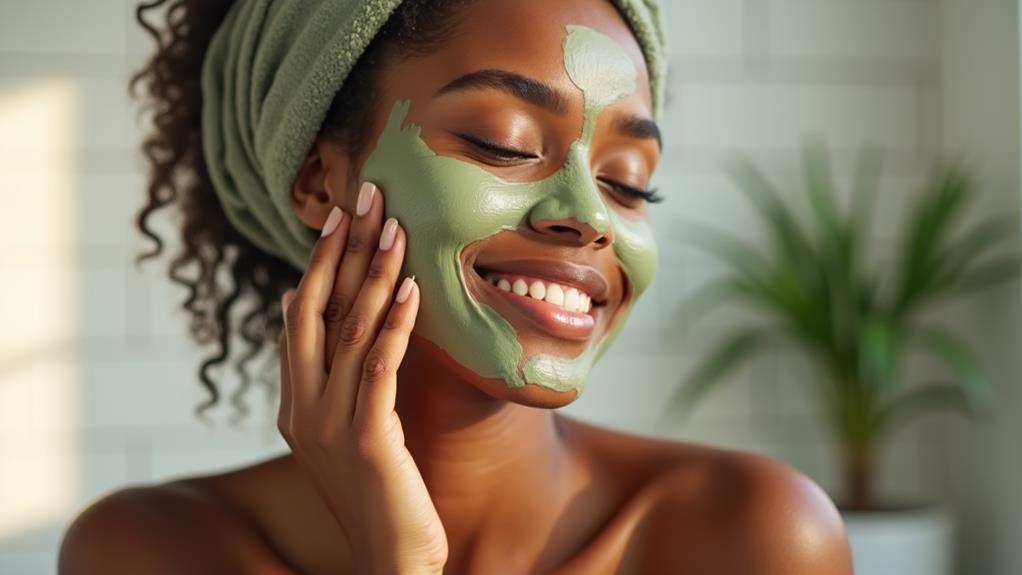
When it comes to acne, black skin has unique characteristics that can affect both the development and treatment of blemishes. Your skin contains more melanin, the pigment responsible for skin color, which provides natural protection against UV rays but also makes it more prone to hyperpigmentation and scarring.
Black skin tends to have larger sebaceous glands, which produce more oil. This excess sebum can clog pores, leading to increased acne formation.
Your skin's structure also includes thicker and more compact dermal layers, which can make it more resilient but also more prone to keloid scarring.
You'll find that your skin is often more reactive to inflammation, which can result in post-inflammatory hyperpigmentation (PIH) after acne lesions heal. This means dark spots may linger long after the acne has cleared.
Additionally, your skin's natural tendency to be drier on the surface can lead to a build-up of dead skin cells, potentially exacerbating acne.
Understanding these characteristics is vital for developing an effective acne treatment plan that addresses your skin's specific needs and minimizes the risk of long-term discoloration or scarring.
Common Acne Triggers
Over time, you may notice certain factors that seem to trigger or worsen your acne. While acne triggers can vary from person to person, some common culprits affect many individuals with black skin.
Hormonal changes, particularly during puberty, menstruation, and pregnancy, can lead to increased oil production and acne flare-ups. Stress is another significant trigger, as it can stimulate hormone production and inflammation.
Your diet may also play a role, with some studies suggesting that high-glycemic foods and dairy products might exacerbate acne in some people.
Environmental factors like humidity and pollution can contribute to clogged pores and breakouts. Certain skincare and hair products, especially those containing oils or comedogenic ingredients, may block your pores and worsen acne.
Excessive sweating, particularly when trapped under tight clothing or headgear, can create an ideal environment for acne-causing bacteria to thrive.
Picking or squeezing existing acne lesions can introduce more bacteria and cause further inflammation, potentially leading to scarring.
Ultimately, some medications, including corticosteroids and certain birth control pills, may trigger or worsen acne as a side effect.
Hormonal Influences on Breakouts
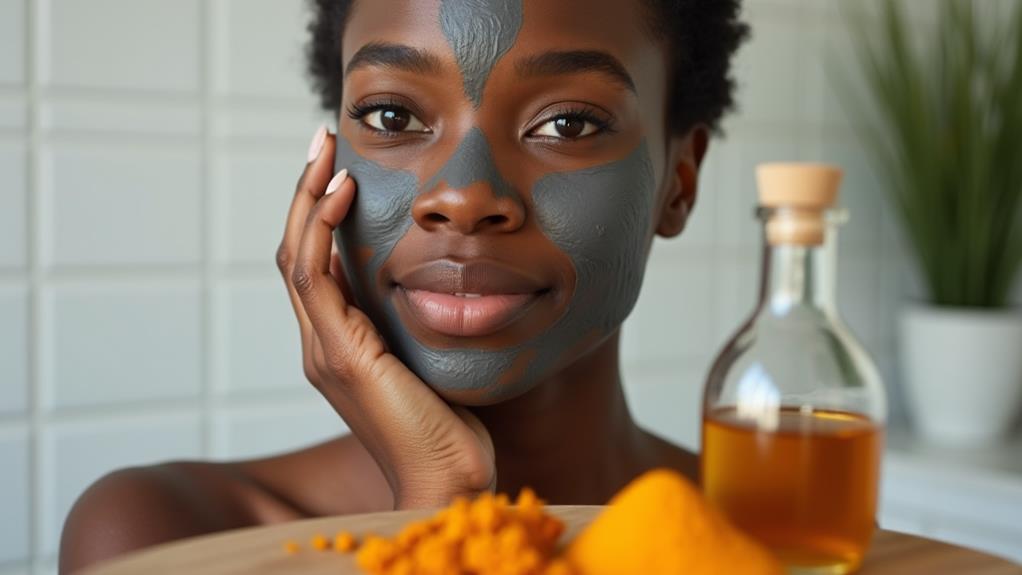
Hormones play a significant role in the development and persistence of acne, particularly in individuals with black skin. Your body's hormonal fluctuations can trigger excess oil production, leading to clogged pores and breakouts.
During puberty, both males and females experience a surge in androgens, which stimulate sebum production and contribute to acne formation.
For women, menstrual cycles can cause hormonal shifts that impact skin health. You might notice more breakouts around your period or during ovulation.
Polycystic ovary syndrome (PCOS) can also increase androgen levels, exacerbating acne in some women with black skin.
Stress is another factor that can disrupt your hormonal balance. When you're stressed, your body produces more cortisol, which can stimulate oil glands and worsen acne.
Additionally, pregnancy and menopause can cause hormonal changes that affect your skin.
It's important to note that black skin tends to have larger sebaceous glands, making it more susceptible to hormonal acne.
If you're experiencing persistent breakouts, consider consulting a dermatologist who specializes in treating skin of color. They can help identify any underlying hormonal imbalances and recommend appropriate treatments.
Diet and Acne Connection
The link between diet and acne has been a topic of debate among dermatologists for years. While research is ongoing, some studies suggest that certain foods may influence acne development in people with black skin.
You might want to pay attention to your intake of high-glycemic foods, such as white bread, sugary snacks, and sodas. These foods can cause rapid spikes in blood sugar, potentially leading to increased inflammation and oil production in your skin.
Instead, opt for low-glycemic alternatives like whole grains, fruits, and vegetables.
Dairy products, especially skim milk, have also been associated with acne flare-ups in some individuals. If you suspect dairy might be triggering your breakouts, consider reducing your consumption or trying lactose-free alternatives.
On the flip side, foods rich in omega-3 fatty acids, like fish, flaxseeds, and walnuts, may help reduce inflammation and improve your skin's overall health.
Antioxidant-rich foods, such as berries and leafy greens, can also support skin health by combating free radicals.
Skincare Routine Dos and Don'ts
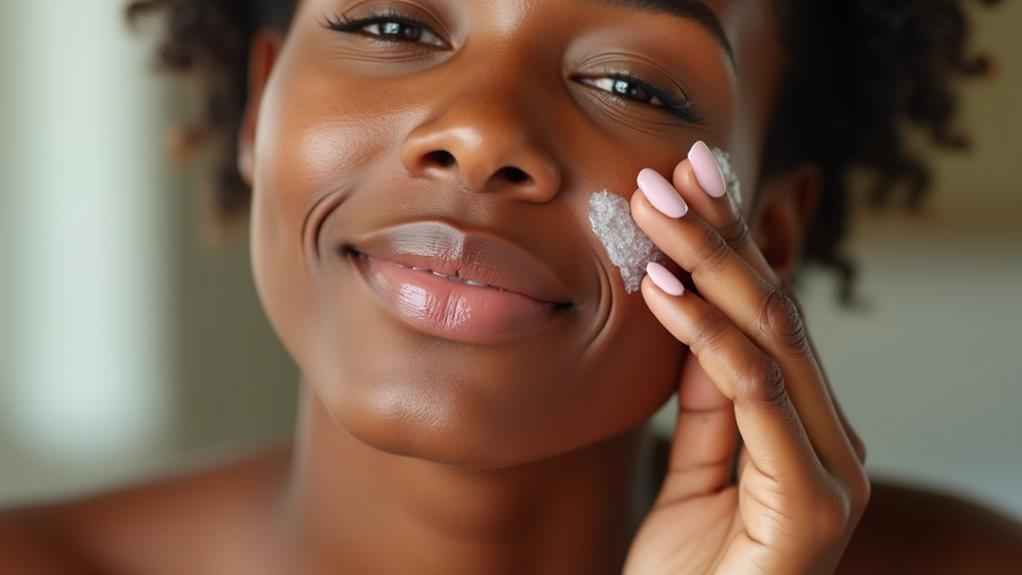
While monitoring your diet can help manage acne, establishing an effective skincare routine is equally important for those with black skin.
Start by cleansing your face twice daily with a gentle, non-comedogenic cleanser. Avoid harsh scrubs or exfoliants that can irritate your skin and worsen acne. Instead, opt for chemical exfoliants like salicylic acid or glycolic acid, which can help unclog pores without causing inflammation.
Don't skip moisturizing, even if you have oily skin. Choose a lightweight, oil-free moisturizer to keep your skin hydrated without clogging pores.
Always use sunscreen during the day, as UV exposure can darken acne scars and hyperpigmentation. Look for non-comedogenic, broad-spectrum sunscreens with at least SPF 30.
Do incorporate spot treatments containing benzoyl peroxide or tea tree oil to target individual acne lesions. However, don't overuse these products, as they can dry out your skin.
When using acne treatments, start with lower concentrations and gradually increase as your skin adjusts.
Effective Topical Treatments
Effective topical treatments play an essential role in managing acne for those with black skin. You'll find several over-the-counter and prescription options that can help combat breakouts and improve your skin's appearance.
Benzoyl peroxide is a common acne-fighting ingredient that kills bacteria and removes excess oil. However, it can be drying and may cause temporary skin lightening, so start with a low concentration.
Salicylic acid is another effective treatment that exfoliates and unclogs pores. It's generally well-tolerated by those with black skin.
For more severe acne, you might consider prescription-strength retinoids like tretinoin or adapalene. These vitamin A derivatives promote cell turnover and prevent pore blockages. They can be irritating at first, so introduce them gradually into your routine.
Alpha-hydroxy acids (AHAs) like glycolic or lactic acid can help exfoliate and improve skin texture. They're particularly useful for addressing post-inflammatory hyperpigmentation, a common concern for those with black skin.
When using any topical treatment, it's vital to apply sunscreen daily. Many acne treatments can increase sun sensitivity, and UV exposure can worsen hyperpigmentation.
Choose a non-comedogenic, broad-spectrum sunscreen to protect your skin without clogging pores.
Professional Acne Management Options
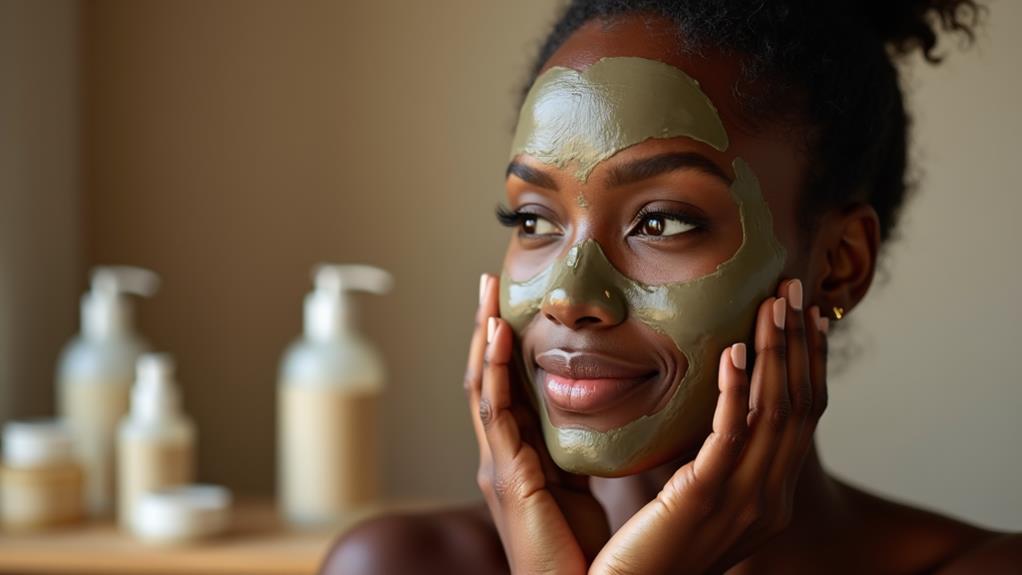
For those with persistent or severe acne, professional treatments offer advanced solutions beyond at-home care. Your dermatologist might recommend chemical peels, which use stronger acids than over-the-counter products to exfoliate and unclog pores. These can be particularly effective for addressing hyperpigmentation common in Black skin.
Microdermabrasion is another option, gently removing dead skin cells and promoting collagen production. However, it's vital to guarantee your provider is experienced with darker skin tones to avoid potential irritation or discoloration.
For more severe cases, your doctor may suggest laser therapy. Certain lasers can target acne-causing bacteria and reduce inflammation without damaging the skin's surface. Again, choosing a professional skilled in treating melanin-rich skin is necessary.
Corticosteroid injections can quickly reduce inflammation in large, painful cysts. This treatment is especially useful for preventing or minimizing post-inflammatory hyperpigmentation.
In some cases, oral medications like antibiotics or isotretinoin may be prescribed. These systemic treatments can address acne from within, but they require careful monitoring, especially in patients with darker skin tones, to manage potential side effects and guarantee ideal results.
Preventing Post-Inflammatory Hyperpigmentation
Post-inflammatory hyperpigmentation (PIH) often follows acne breakouts in Black skin, making prevention an essential part of acne management. To minimize the risk of PIH, you'll need to focus on both treating existing acne and protecting your skin from further damage.
Start by using gentle, non-irritating skincare products that won't exacerbate inflammation. Look for cleansers and moisturizers formulated for sensitive skin, and avoid harsh scrubs or exfoliants.
When treating acne, opt for products containing ingredients like salicylic acid, benzoyl peroxide, or retinoids, but introduce them gradually to prevent irritation.
Sun protection is critical in preventing PIH. Always wear a broad-spectrum sunscreen with at least SPF 30, even on cloudy days. Choose a non-comedogenic formula to avoid clogging pores.
If you're using acne treatments that increase sun sensitivity, be extra diligent about sun protection.
Resist the urge to pick or squeeze acne lesions, as this can increase inflammation and the likelihood of PIH. Instead, use spot treatments or consult a dermatologist for professional extractions if necessary.
Long-Term Acne Scar Prevention
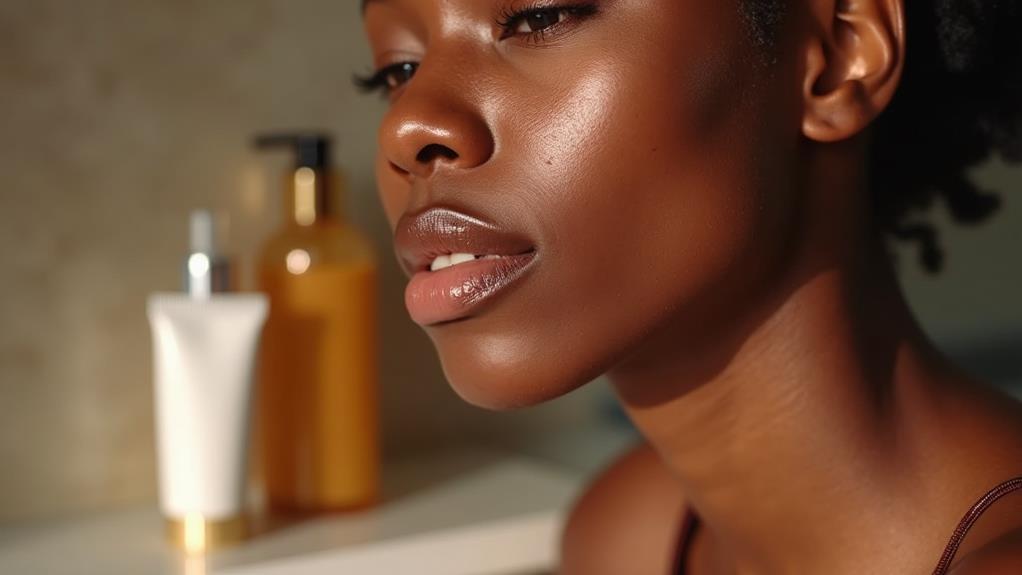
Beyond treating current acne breakouts, preventing long-term scarring is essential for maintaining healthy skin. To minimize the risk of permanent acne scars, you'll need to adopt a proactive approach.
First, resist the urge to pick or squeeze your pimples, as this can lead to deeper inflammation and scarring. Instead, use gentle, non-abrasive cleansers and avoid harsh scrubs that may irritate your skin.
Incorporate products containing ingredients like retinoids, vitamin C, and niacinamide into your skincare routine. These can help promote cell turnover, boost collagen production, and fade existing dark spots.
Don't forget to apply a broad-spectrum sunscreen daily to protect your skin from UV damage, which can worsen scarring and hyperpigmentation.
If you're dealing with severe acne, consult a dermatologist who can prescribe stronger treatments or recommend professional procedures like chemical peels or microneedling. These interventions can greatly reduce the likelihood of long-term scarring when performed early.


